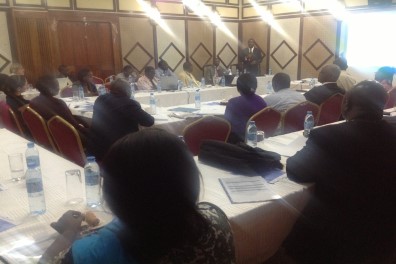More than 30 delegates were gathered to discuss Uganda’s priorities on water. The meeting was attended by a broad range of stakeholders including public, private, CSO’s, academia, research institutions and international organisations, to review progress on the Millennium Development Goals (MDGs) and discuss options for a new sustainable development framework.
The Minister thanked GWP for supporting the Ministry of Water and Environment to organize the second round of national consultations. He briefed the meeting about Uganda’s priorities that the national consultations need to consider. The Minister indicated that the first priority for Uganda is peace, security, law and order. He said that these are the cornerstones of development and that no country can develop without them.
The Minister however noted that while security is often interpreted to refer to law and order, there are three other securities that fall into this category, namely water security, energy security and food security. The Minister discussed at length the issue of water security and pointed out the following issues for consideration by the meeting participants:
- Although water is often taken for granted it is important for human wellbeing and goes beyond domestic use to irrigation, livestock, fisheries, health, tourism etc. He appreciated the fact that water was being considered as a standalone Sustainable Development Goal (SDG) but challenged the participants to discuss water within the framework of the hydrologic cycle.
- Water can be a source of conflict but it can also be a source of cooperation. He noted that water can cause wars if not well managed well.
- Water is linked to human welfare, economic transformation and environmental sustainability.
The Minister also pointed out that energy security in Uganda is closely linked to water security. He urged for water and energy security to be interlinked, as water is needed to generate energy and energy is needed to deliver water. He noted that energy is needed to transform the economy and there is therefore a nexus between water and energy. He noted that high population growth in Uganda is linked to lack of energy with only 15% of Ugandans having access to electricity.
The Minister further noted that Food Security is also linked to Water Security and Energy Security. He elaborated on how the three securities are linked and why these linkages should be considered during the discussions of the SDG and targets for water.
The Minister challenged the participants to critically think about how water can contribute to achievement of the national vision for Uganda which is a “Transformed society from a peasant to a middle income economy by the year 2014”.
He noted that the overarching goal of the national vision is poverty eradication, but it is difficult to achieve without rethinking the ways we are developing our policies and strategies globally, regionally and nationally.
Photo: The Minister talked at the Ugandan national consultation in Kampala.
